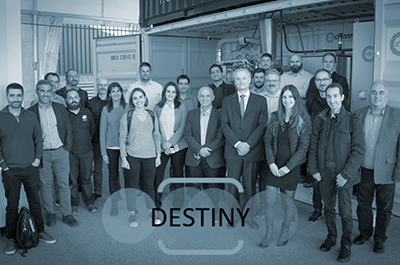
Manufacturing is the driving force behind Europe’s economy, providing over €6,553 billion of GDP, representing approximately 21% of the EU GDP and providing about 20% of all jobs (more than 30 million) in 25 different industrial sectors. Within a context of climate change legislation, volatile energy prices, and increased environmental awareness, manufacturing has to focus on the introduction of modern and renewable energy solutions as well as on sustainability and eco-efficiency.
The EU-funded DESTINY project aims at contributing to move manufacturing firmly forward in tackling the current energy-related issues by realizing a functional, green and energy saving, scalable and replicable solution, exploiting microwave technology for continuous material processing in energy intensive industries (ceramics, steel, cement). The DESTINY module, a container-sized, fully electrical, high-temperature processing system, will reduce the direct dependence of these energy intensive industries on fossil fuels by:
- Allowing for a -30% to +30% energy input within renewable energy sources (RES) fluctuations timeframes, without significant losses in specific energy efficiency;
- Improving energy efficiency by 30%;
- Improving resource efficiency by 30%;
- Decreasing CO2 emissions by 40%;
- Decreasing OPEX and CAPEX by 15%.
Despite very demanding, these objectives are necessary to help laying the basis for a greener future.
The project started in 2018 and will end in March 2023. During these years the Consortium (15 partners from Spain, Italy, Austria, Greece, Portugal, Belgium, Switzerland) has worked to develop all the technical solutions necessary to guarantee the continuous processsing of granular feedstock through microwave (MW) heating. Indeed, MW heating is a well-established heating technology for many industrial sectors with low-temperature processes (i.e. drying) and low power demand. As for high-temperature processing...completely different story. MW heating has a number of drabacks in these applications: limited knowledge about MW-material interaction at high temperatures on continuous processes, process thermal runaways, changes in the material's behaviour that have to be managed, continuous process limitations, difficulties in reliably measuring temperature (the chemical reactions driver) of the materials being processed.
Several members of the project consortium have already faced these difficulties. Within the European project DAPhNE (‘Development of adaptive ProductioN systems for Eco-efficient firing Processes’ - FoF.NMP.2012-1 / GA No. 314636), they successfully demonstrated a disruptive first milestone in processing high temperature materials using microwave technology. The DAPhNE project was distinguished by the EC as a flagship project and was one of the TOP 3 projects (out of about 150 applicants) in the German Sustainability Award 2016, category R&D. DAPhNE demonstrated the first worldwide continuous high-temperature MW production of ceramic frits (main component of the glaze coat on top of ceramic tiles), glass and clinker (main pre-product for cement). In addition, the energy consumption of the small pilot system developed during the DAPhNE project has shown very promising (50 % and higher energy savings in comparison with small systems of the same size exploiting gas burners).
The lesson learnt from DAPhNE has made it possible to boost technolgoy update and transfer to process intensification grounding on reaction speed, selective heating and flexibility adapted to the production. Indeed, DESTINY targets a production of 20kg/h (scalable to higher rates when using array of modules) enabling commercial (pilot) production of special and novel products.
After three intensive years of technical developments, trials (and COVID-related restrictions) finally DESTINY reached the demonstration phase. In fact, this phase has just started at the KERABEN GRUPO SA (Project Coordinator) premises. The next four months will be months of intensive trials and data collection to prove the validity of the solutions developed during the project.
Polytechnic of Milan (POLIMI) is currently involved in the project as supporting partner (third-party “in-kind contribution” Art. 11 GA) of Univeristy Polythecnic of Marche (UNIVPM) – DESTINY consortium member - in the development of two monitoring systems acting at MW-furnace and process levels resepctively. As standard temperature measurement systems cannot be exploited for monitoring the temperature evolution of the raw materials being processed in the furnace, because of the interactions with the MW field, the teams of POLIMI, led by Prof. Paolo Chiariotti, and UNIVPM, led by Prof. Gian Marco Revel, are developing an AI-based virtual sensor that collects data from the process and infere the temperature of the material, thus making it possible to track the chemical reactions taking place in the furnace for process control purposes. This is quite a demanding task, given the potential process instabilities, and the outcomes of the research can potentially change the monitoring of every MW heating based systems. As the process level is concerned, the remote monitoring system that has been jointly developed by UNIVPM and POLIMI brings the process into the framework of Industry 4.0, by making it possible for plant managers to remotely monitor the process and eventually ask for adaptations depending on the energy and production needs.
A breakthrough activity in a breakthrough project that represents a further step towards sustainability in energy-demanding manufacturing sectors.
